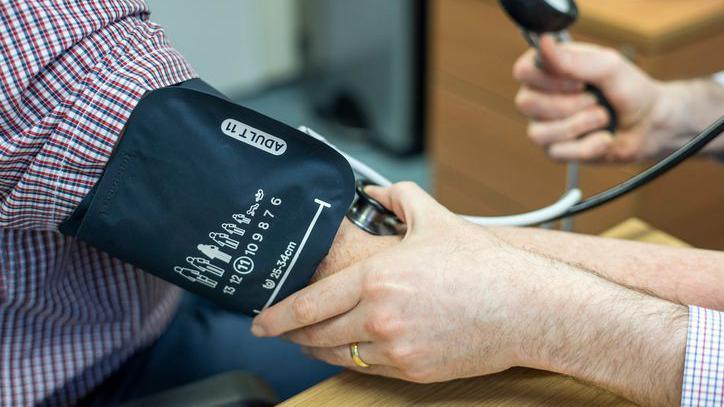Why people are ignoring heart check invites

Professor Julia Newton has looked into what stops people accessing heart checks
- Published
"Highbrow" GP letters about heart check-ups put people off and instead preventative care needs to be taken to local communities, a health official has said.
Professor Julia Newton, medical director of Health Innovation North East and North Cumbria, said the region had one of the highest rates of heart disease in England and yet the uptake of the free NHS heart checks remained low.
In 2023 Prof Newton and her team studied the barriers that people in Middlesbrough faced in accessing these checks.
Since then several new methods to promote these checks, including getting football clubs and mosques involved, have been explored across the region, she said.
The NHS offers heart checks to all those between 40 and 74 every five years. These tests can help determine if you are at a higher risk of diseases such as stroke.
But uptake is low across the country and only about a third of people take the offer in north-east England, said Prof Newton.
People are usually invited to get a heart check via a letter from their GP.
But Prof Newton's research in Middlesbrough found that these letters were often written in a "highbrow way" and easily ignored by people who had never experienced heart problems in the past.
People also did not necessarily have the time to book a GP appointment for the check-up, she said.
"They didn't feel that it was easy to access at a time that was right and convenient to them."
'Protects NHS'
Using the findings from the Middlesbrough study, the team worked with locals in the town to come up with better ways to increase the uptake of the health checks.
Prof Newton said they found that taking the heart checks out of a GP's office and into the wider community was key, as well as getting buy-in from local leaders.
"For example if the local imam says this is something that is important for you to do, people are much more likely to do that rather than a doctor or a nurse who they have never met before saying it's important," she said.
The team have also started conducting the heart-checks with a finger-prick blood test which can be done anywhere and can provide cholesterol results within minutes, said Prof Newton.
"So we're able to talk to the person about their risk and give them a result there and then in sort of a one-stop shop kind of way."
This means they have been able to conduct tests at a variety of locations including a Middlesbrough FC match, the Middlesbrough Mela as well as the North Shields Fish Quay and across north Cumbria while embedded within the local learning disability team.
Prof Newton said this type of preventative care could help slow down or reverse symptoms of cardiovascular disease before they became more serious.
"Ultimately it will protect the precious resources of the NHS."
Follow BBC North East on X, external and Facebook, external and BBC Cumbria on X, external and Facebook, external and both on Nextdoor and Instagram, external.
Get in touch
Do you have a story suggestion for BBC North East & Cumbria?